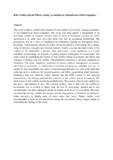Please use this identifier to cite or link to this item:
https://cris.library.msu.ac.zw//handle/11408/771Full metadata record
| DC Field | Value | Language |
|---|---|---|
| dc.contributor.author | Mutanga, Marcus | - |
| dc.contributor.author | Kaja, Primrose | - |
| dc.contributor.author | Moyo, Nokuthula G. | - |
| dc.date.accessioned | 2016-03-13T09:40:17Z | - |
| dc.date.available | 2016-03-13T09:40:17Z | - |
| dc.date.issued | 2015 | - |
| dc.identifier.issn | 2231-2463 | - |
| dc.identifier.uri | http://www.ijmbs.com/Vol5/3/11-marcus-mutanga.pdf | - |
| dc.description.abstract | This study sought to establish the existence of role conflict and its effects among accountants in the Zimbabwean listed companies. The study was done against a background of an increasing number of company closures some as result of fraudulent activities by senior professionals, in some cases involving those who had an accounting background. The government was on a drive to implement the Zimbabwe Agenda for Sustainable Socio-Economic Transformation (ZimAsset) policy document aimed at resuscitating the economy using all inclusive strategies and intended inclusive benefits, making the improvement of the welfare of all stakeholders a priority. This made such a study significant as it would contribute to knowledge on strategies of getting positive performance by accountants. The study aimed at establishing the sources of role conflict among accountants, the effects and strategies of dealing with role conflict. The population comprised of all listed companies in Zimbabwe. The target population comprised of internal auditors, management accountants and financial accountants. A combination of stratified and purposive sampling was used. A sample of sixty respondents was taken. A structured questionnaire was used as the main data collection tool, as it allowed for focused questions and follow up questions where necessary. Qualitative data was collected, coded, inputted into the SPSS version 23 and analyzed quantitatively. The findings indicated the existence of role conflict among accountants. The main source of role conflict was having multiple roles. The greatest effect of role conflict was job stress and intention to quit. The common strategy used to deal with role conflict by accountants was to explain to others what the role of accountants entailed and it was recommended that other employees should be trained on the basics of accounting. The study recommended having suitable job designs and the engagement of industrial psychologists where necessary to handle cases of stress when they occur. Further studies were recommended to focus on job satisfaction among the accountants using a bigger sample to consolidate the findings of this study. | en_US |
| dc.language.iso | en | en_US |
| dc.publisher | Cosmic Journals | en_US |
| dc.relation.ispartofseries | International Journal of Management and Business Studies;Vol. 5, Issue 3; p. 70-74 | - |
| dc.subject | Accountants, role conflict, effects | en_US |
| dc.title | Role conflict and the effects among accountants in Zimbabwean listed companies | en_US |
| dc.type | Article | en_US |
| item.openairecristype | http://purl.org/coar/resource_type/c_18cf | - |
| item.cerifentitytype | Publications | - |
| item.grantfulltext | open | - |
| item.languageiso639-1 | en | - |
| item.fulltext | With Fulltext | - |
| item.openairetype | Article | - |
| Appears in Collections: | Research Papers | |
Files in This Item:
| File | Description | Size | Format | |
|---|---|---|---|---|
| Role Conflict and the Effects Among Accountants in Zimbabwean Listed Companies.pdf | 6.41 kB | Adobe PDF |  View/Open |
Page view(s)
48
checked on Jul 26, 2024
Download(s)
20
checked on Jul 26, 2024
Google ScholarTM
Check
Items in MSUIR are protected by copyright, with all rights reserved, unless otherwise indicated.


